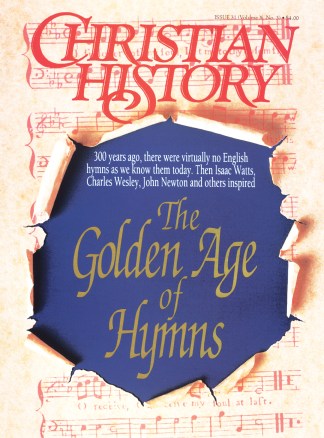Church sanctuaries still ring out with the two-hundred-year-old hymns of Watts, Wesley, Newton, and Cowper. But is lasting popularity alone an indicator of true literary quality? Literary historian W. J. Courthope observes that “the critical world is yet to be half-persuaded that a hymn can be poetry.”
Early hymns were written in an age that produced the rhymed couplets of Pope, the satires of Swift, and the novels of Defoe, Fielding, and Johnson. These works demonstrate form, elegance, urbanity, and wit. Can hymns measure up?
Plain and Direct
First, we must admit that not all the poetry of any age or any poet will attain excellence. The hymns of this age are uneven.
The best hymns, however, represent a kind of literary counterculture. Contemporary poetry tended to be ornate and contrived. It was intended for a sophisticated audience that demanded a polished style.
The hymns were characterized by a plain style and simple expression. Yet because they were vivid and direct, the best hymns not only equaled, but even surpassed, much of the literature of the day. Literary critic George Saintsbury, for example, pronounced “Rock of Ages” a “great poem.”
A Distinct Purpose
Hymns took a simple, forceful style because they had a distinct purpose and audience. The purpose of eighteenth-century poetry was enlightenment and entertainment. The purpose of the hymn, however, was public and private worship. Hymns were designed not to glorify the poet but to aid worshipers in expressing their feelings to God.
In his introduction to The Oxford Book of Christian Verse, Donald Davie asks what sort of language is most appropriate when speaking to or about God. He concludes that it is “a language stripped of fripperies and seductive indulgences, the most direct and unswerving English.… When speaking to God, in poetry as in prayer, any sort of prevarication or ambiguity is … unthinkable.”
In addition, in Davie’s words, hymns “ought to be meaningful to plain men and women, the poet’s fellow-Christians.” Isaac Watts, for example, expressed in the prefaces to his hymns that his aim was not poetic. Louis Benson explains in The English Hymn, “His remarks were addressed to literary critics, who he feared would misunderstand the purpose of his work.… It involved nothing more than loyalty to the Protestant principle that every part of public worship should be … in a language understood by the people.”
Although Watts wrote for a relatively sophisticated audience, his “felicity lay in his gift for locating the common level and his refusal to soar.”
Thus, the poetry of Watts and other hymn writers sometimes fails to satisfy the tastes of the literati. But it clearly achieved its stated purpose: leading common people in worship.
Philip Doddridge once told Watts about the effect of his hymns in a village chapel: “There were tears in the eyes of several of the people as they sang his hymns, and after the service was over, some of them confessed that they could not sing at all, so deeply were their minds affected. Such a reward might well be coveted by the greatest of poets.”
Dr. Jan Anderson is Professor of English at Clearwater (Fla.) Christian College.
Copyright © 1991 by the author or Christianity Today/Christian History magazine.Click here for reprint information on Christian History.










